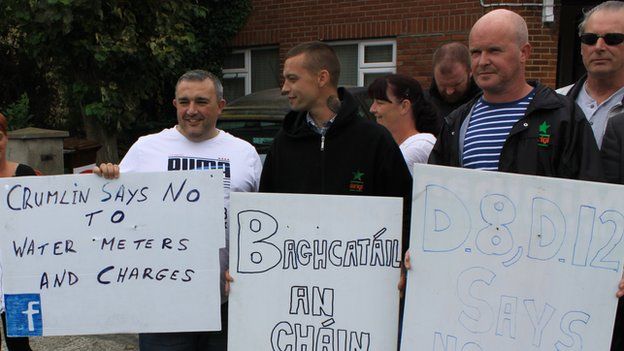Anger at Irish water charges reaches boiling point
- Published

Tap water in the Republic of Ireland until now has been free - but the introduction of charges as an austerity measure is not proving popular.
The Emerald Isle can thank a damp climate for its greenery, with plenty of rain and no shortage of water. But a drought of investment for decades means its water infrastructure falls short of international standards.
In Boyle in County Roscommon in the west of Ireland, shoals of trout hover in the crystal-clear river in the town, but the drinking water supply presents a different picture.
The people of Boyle must boil their tap water as it is unfit to drink, contaminated by bacteria that out-of-date treatment plants cannot purify.
As he leaves a shop in the town clutching large bottles of water, Sean O'Dowd says he no longer takes any chances.
"You're going to be violently sick for 24 hours - it's as simple as that. It has happened to me twice. But not a third time."
Local shops are doing a booming trade in bottled water - but public opinion has reached boiling point in the town as the charges come into effect.
"I just think in this day and age it's absolutely disgraceful, especially for tourists and everything else. We're not that poor a country that we can't fix this or resolve this," says Aaron Sharkey.
Responding to public anger, an eleventh-hour discount from water charges has been announced for those with undrinkable tap water, but it will not help some businesses.
For some people, the charges will be hard to swallow, as Diarmaid Fleming reports
Alison Clarke, who runs Clarke's Bar and Restaurant, has installed a water filtration system so she can wash foodstuff and make ice.
"At the moment we are supposed to boil the water before we use it to wash vegetables or wash salad.
"In the first few weeks we were buying bottled water like everybody else but the consumption of water we would use on a business level in preparing food in the kitchen meant it was impossible to continue this way.
"So I had to introduce a filtration system to prove that it's safe for my customers that come in here," she says.
Raising money from water charges was a condition imposed on Ireland by the EU-IMF-ECB troika as part of the country's bailout in 2010 following economic collapse.
Protests have taken place in different parts of the country, usually when contractors come to install meters for the new water-charging regime.
At one such demonstration in a west Dublin suburb, contractors watch from their vans as residents chant: "Irish water will be free, from the river to the sea."
The protest is good humoured. "The workers are complaining they can't sleep at night over the water issue - because they're sleeping so much during the day, in their vans," says protest organiser, Dublin City councillor Pat Dunne.
"We could supply the rest of Europe with water - we get that much of it. We're all wondering now what's going to happen - are they going to charge us for air?" asks another protester.
Paul Parsons is not involved in the protests but, standing outside his front door, he expresses a view which he claims is widespread among his neighbours.
"I don't think the government realise how much of a burden it would be to the people around this area who are already stretched financially - paying tax after tax after tax - and this is just one tax too far."
Demonstrations elsewhere in Dublin have been angrier - with some protesters warned they could face jail if they breach court orders.
Bills will range from 176 euros (£137) a year for a single-person household to nearly 500 euros (£389) for a family of four adults.
Until now, water was funded from central and local government taxes - but paying for an essential that seemed to come for free appears to have generated more steam than most austerity cuts - with phone-ins and talk-shows deluged with debate over the measure.
Revelations that 86m euros is being spent on consultants to set up a new state-sponsored company in charge of water services, Irish Water, led to a national political storm.
Irish Water says it will run the system previously operated by local authorities much more efficiently. It says bringing Ireland's waterworks up to international standards will cost nearly 2bn euros for the next two years - to fix a system which loses almost half its treated water through leaks from old pipework.
"We have a big problem in terms of our infrastructure - it's not in a state that's fit to meet the needs of a modern economy," says Irish Water's Elizabeth Arnett.
"We need to change the way we fund water services and that means introducing domestic water charges where people will pay directly for the amount of water they will use - fix the leaks, increase the amount and capacity we have in the system and ensure that our wastewater treatment plants are all environmentally compliant."
Those behind water charging also say it will help conservation - as people will be more careful in their usage.
The road to economic recovery has been a long one for Ireland. But while recent economic data shows signs of hope, the bite of austerity - such as the new water charge - continues to be felt.
- Published30 September 2014
- Published19 June 2014
- Published9 April
- Published26 September 2014